

The Right Skills: Celebrating Skills in the Arts, Humanities and Social Sciences (AHSS) The British Academy’s Skills project has sought to articulate and celebrate the skills gained through studying arts, humanities and social sciences (AHSS), and to lead a high-level debate about the value of these skills to the individual, to society and to the economy.
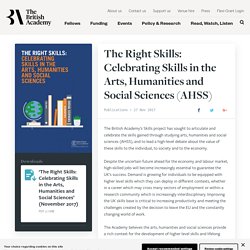
Despite the uncertain future ahead for the economy and labour market, high-skilled jobs will become increasingly essential to guarantee the UK’s success. Demand is growing for individuals to be equipped with higher level skills which they can deploy in different contexts, whether in a career which may cross many sectors of employment or within a research community which is increasingly interdisciplinary. Dynamic Development Guide web. ICT Profile. Our survey shows only 41% of students feel prepared for the digital workplace. These are the 5 “super skills” you need for jobs of the future. Chances are your job description has changed over the past five years.
Or maybe your role didn’t even exist a short time ago. Untitled. Developing the skills for the 21st century jobs market. As mother-daughter duo Annie and Badjie Guerrero were developing Cravings*, their catering, hotel and restaurant conglomerate in the Philippines, they stumbled across a surprising obstacle to the growth of their business.
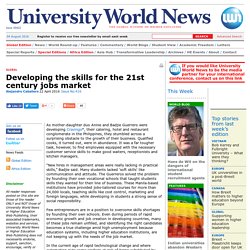
Qualified cooks, it turned out, were in abundance. It was a far tougher task, however, to find employees equipped with the necessary customer service skills to make good waiters, receptionists and kitchen managers. “New hires in management areas were really lacking in practical skills,” Badjie said. Many students lacked 'soft skills' like communication and attitude. The Guerreros solved the problem by founding their own vocational schools that taught students skills they wanted for their line of business.
Few entrepreneurs are in a position to overcome skills shortages by founding their own schools. High-skilled jobs History shows how a labour market’s needs constantly shift with technology – and in an unpredictable way. What does the future hold? Skills-based education. Michèle Drechsler sur Twitter : "Des universités traduisent leurs diplômes en listes de compétences, pour faciliter l’embauche. Government should use apprenticeship levy to support technical education programmes that boost skills, argues Professor Lord Kumar Bhattacharyya. Chairman of WMG at the University of Warwick also says industry must demand programmes that are “built on real business need” Professor Lord Kumar Bhattacharyya, Chairman of WMG at the University of Warwick, has called for a statutory apprenticeship levy to support technical education programmes to transform training and skills.
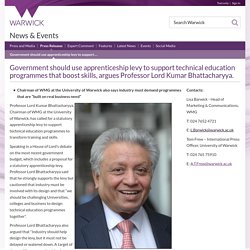
Speaking in a House of Lord’s debate on the most recent government budget, which includes a proposal for a statutory apprenticeship levy, Professor Lord Bhattacharyya said that he strongly supports the levy but cautioned that industry must be involved with its design and that “we should be challenging Universities, colleges and business to design technical education programmes together”. Professor Lord Bhattacharyya also argued that “Industry should help design the levy, but it must not be delayed or watered down. The Future of Work. Carl Benedikt Frey | University of Oxford Throughout history, technological progress has created enormous wealth but also caused great disruption.
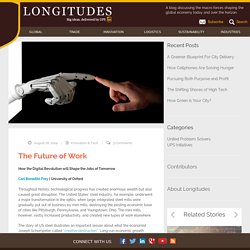
The United States’ steel industry, for example, underwent a major transformation in the 1960s, when large, integrated steel mills were gradually put out of business by mini mills, destroying the existing economic base of cities like Pittsburgh, Pennsylvania, and Youngstown, Ohio. The mini mills, however, vastly increased productivity, and created new types of work elsewhere. The story of US steel illustrates an important lesson about what the economist Joseph Schumpeter called “creative destruction”: Long-run economic growth involves more than just increasing output in existing factories; it is also implies structural changes in employment. Top ten employability skills. Based on a number of surveys on the skills required by graduates undertaken by Microsoft, Target Jobs, the BBC, Prospects, NACE and AGR and other organisations, here is our summary of the skills which were most often deemed important.
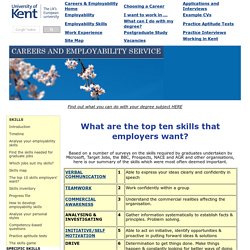
The most important skills to develop in employees to drive company growth over the next five years were (according to the Flux Report by Right Management): Employability & internationalisation: what’s the link? - International Unit. Daisy Jones, Communications Officer for the International Unit attended the breakout session about A competitive workforce - Linking student mobility and long-term employability at the recent conference The Benefits of Brussels: Opportunities and Challenges for European HE, which was organised by the International Unit in collaboration with the DAAD and the Institut Français du Royaume-Uni The competitive workforce session covered employability and mobility, and focused on case studies from France and the UK with speakers Bérangère Pagès, Executive Director Corporate Relations, HEC Paris and Paul Blackmore, Head of Employability and Graduate Development, University of Exeter.
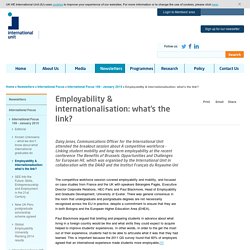
There was general consensus in the room that undergraduate and postgraduate degrees are not necessarily recognised across the EU in practice, despite a commitment to ensure that they are in both Bologna and the European Higher Education Area (EHEA). Presentations from the conference are available here. Collaboration and support in the world of learning technologists – a brief case study.
Background: Students for Webinar Employability Skills Jisc Project The aim of our original Jisc project, run at Abingdon and Witney College between October 2013 and April 2013, was to develop employability skills for Level 3 students in relation to using video conferencing and webinars.
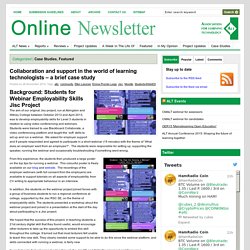
Students were trained to use Blackboard Collaborate, a video conferencing platform and taught the ‘soft’ skills to set up and run a webinar. We asked for employer support and 8 people responded and agreed to participate in a short webinar (15 minutes) with the theme of ‘What does an employer want from an employee?”. Higher education’s crucial nexus of local and global. Analysis of higher education internationalisation has typically gone in two directions.
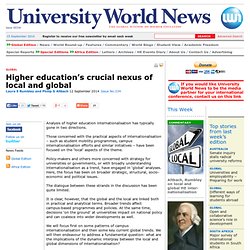
Those concerned with the practical aspects of internationalisation – such as student mobility programmes, campus internationalisation efforts and similar initiatives – have been focused on the ‘local’ aspects of the theme. Policy-makers and others more concerned with strategy for universities or governments, or with broadly understanding internationalisation as a trend, have engaged in ‘global’ analyses. Career Portfolios and the Labour Market for Graduates and Postgraduates in the UK. 2 Intercultural understanding - Introduction. Www.qaa.ac.uk/Publications/InformationAndGuidance/Documents/Recognising-achievement-beyond-the-curriculum-toolkit-13.pdf. PRESS RELEASES - Press release - Commission highlights benefits of foreign language skills for UK students and business. European Commission Press release Brussels, 13 September 2013 Commission highlights benefits of foreign language skills for UK students and business More needs to be done to encourage British students to study languages at A Level and university, according to the European Commission.
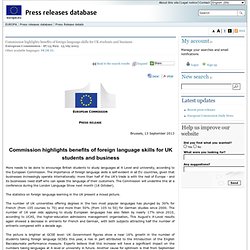
Outstanding research-intensive universities. Learning a language at SOAS, University of London, opens up a world of possibilities for dialogue, understanding, personal development and careers. SOAS offers an unparalleled range of languages beyond the usual European ones, including (but not limited to) Burmese and Thai, Sanskrit and Bengali, Swahili and Hausa, Georgian and Persian. In 2009, the school was awarded the Queen's Anniversary Prize for the excellence, breadth and depth of its language teaching. Languages mapped: what do they speak where you live? Turn autoplay off Edition: <span><a href=" Sign in Beta.

Seminars by theme - assessment and feedback, retention and success. A Foreign Language Is The Best Way To Stand Out In Tough Job Market. 2inShare97 Looking for a cool job? Check out Black Enterprise’s Cool Jobs section for profiles on, well, some cool jobs! Looking for another way to stand out in a tough job market, plus increase your competitiveness and versatility down the road in your career? If you can commit to adding one or more languages to your resume, you’ll instantly stand out from the crowd. Being able to use a foreign language for business purposes is a transferable skill that will always be in demand, no matter what career path you follow.
If you learned a bit of foreign language in high school or college but then just kind of dropped it, this is a great time to pick it up again and get serious about becoming proficient, if not fluent. Maybe you’re wondering: Don’t people everywhere pretty much speak some English by now? Yes, the world’s getting smaller thanks to digital technologies. Chances are that, as you climb the career ladder, you’ll have contact with clients or colleagues living overseas. 1. 2. 3. 4. Télécharger, graver et acheter vidéo, audio, DVD, CD : Boutique ina. How graduates can prove they have the skills employers want. CV writing for graduates: Be sure to highlight your skills, says Clare Whitmell. Photograph: Dorling Kindersley/Getty Employers hire on a mix of attitude, skills and experience. There are ways you can highlight a great attitude on your CV and a robust experience section is crucial. But you also need to prove you have the skills that employers want.
- 10 Tech Skills Every Student Should Have. Do humanities graduates have the edge in the job market? Thinking about where your degree might lead you? 60% of the UK's leaders have humanities, arts or social science degrees. Photograph: Dario Lopez-Mills/AP.